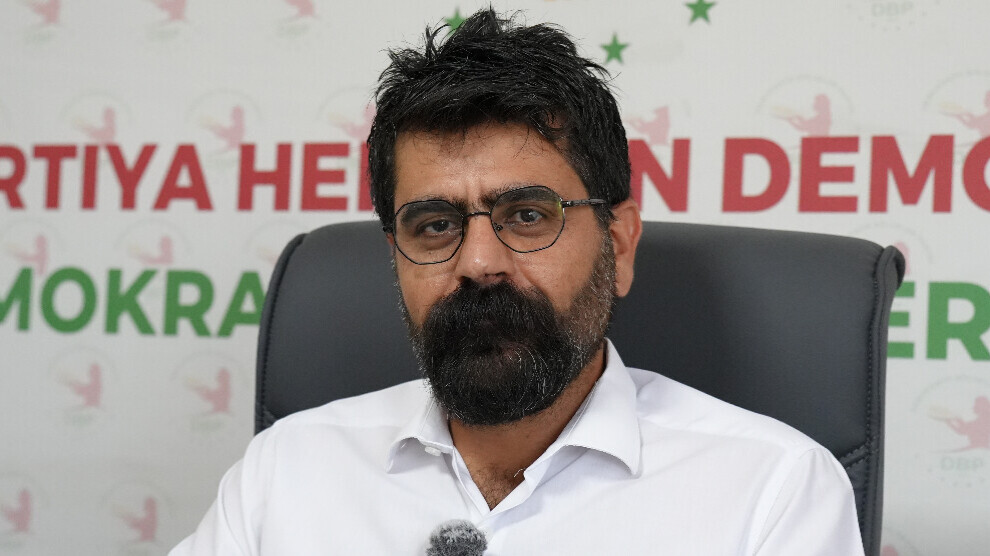Şeker: People are both cautious and hopeful about the new process
Bünyamin Şeker stated that the people are cautiously hopeful.
Bünyamin Şeker stated that the people are cautiously hopeful.

The Democratic Regions Party (DBP) and the Peoples’ Equality and Democracy Party (DEM Party) continue their efforts across various cities to widely communicate Abdullah Öcalan’s “Call for Peace and a Democratic Society.”
Bünyamin Şeker, a lawyer and member of the DBP Central Committee, shared his assessment of the ongoing campaign with ANF, launched in April under the slogan “We are organizing freedom from the streets to the neighborhoods, from the neighborhoods to the cities,” as well as the broader process of “Peace and Democratic Society.”
Everyone must take part in the process
Şeker said that the campaign is ongoing indefinitely in many parts of Kurdistan, and emphasized that, in line with the DBP’s understanding of democratic politics, the party must remain in constant interaction with the people.
He described the new period as a “process of peace and democratic society,” and stressed the importance of broad participation.
Şeker said: “We are, after all, speaking of a new phase in which every individual must assume a role and a mission on a societal level, one in which everyone should see themselves involved.
To be honest, it would be inaccurate to claim that we have fully eliminated all the question marks in people’s minds since February 27. We have not yet completed that task.”
Lack of concrete steps causes concern
Şeker said: “Our society is not in a position to be reassured by abstract statements alone, or to develop trust without seeing something concrete.” He noted that the people’s historical experiences play a significant role in shaping this perspective.
Şeker added: “At the end of the day, everyone is following the process. However, there is a serious lack of practical steps that we can consider on the part of the government or the state. This only deepens concern and distrust. We are talking about the society of Kurdistan, about the Kurdish people.
A people who have been subjected to denial, assimilation, and rejection for over a century. And in the past fifty years, this society has become conscious and politicized through the Kurdish political movement, or more precisely, the Kurdish Freedom Movement.”
Mr. Öcalan’s role and mission give credibility to the process
Bünyamin Şeker acknowledged that some uncertainties persist due to the lack of concrete steps, but stated that trust in Kurdish politics remains strong among the people: “There is no serious distrust in Kurdish politics within society. We see that people believe the mistakes of 2013 are not being repeated, and that there is more hope now than there was in 2013. Today, there is a sense of trust in a process being led by Mr. Öcalan. In other words, Mr. Öcalan’s role and mission serve as a guarantee for the Kurdish people.”
Şeker emphasized that people do not believe Mr. Öcalan can be manipulated or diverted by the state and added: “Everyone can foresee that the state cannot deceive him or push him into another direction, and that generates confidence. In general, there are concerns about trust in the state. There is a perception of being deceived, and fears that the trauma of 2013–2015 might be repeated.”
Şeker stressed that a concrete step from the state would have a major impact on society and said: “We believe that any concrete step taken by the state or the government during this period would strengthen organization within the Kurdish people, foster unity, and help give tangible form to the call for a democratic society. We expect to see very positive reactions in return.”
The main actor in this process is the people
Bünyamin Şeker concluded his remarks: “There is, in fact, a sense of trust in the Kurdish political movement. We do not believe it will act wrongly. If such steps are being taken today without expecting anything in return, it means there is clarity and understanding. There is foresight, and there is self-confidence.
Both in the statement released after the Kurdistan Workers’ Party’s (PKK) dissolution congress and in the developments reflected to the public following meetings with Mr. Öcalan, it has been emphasized that the main actor in this process is the people.
We are trying to communicate this to the people, and they are aware of it. On one hand, there is a sense of optimism; on the other, there is a deeply rooted sense of traumatic distrust accumulated over the years. That mistrust still carries many question marks.”